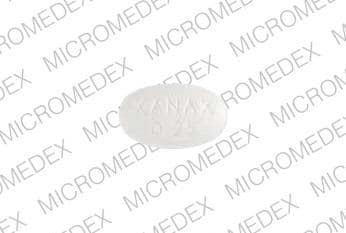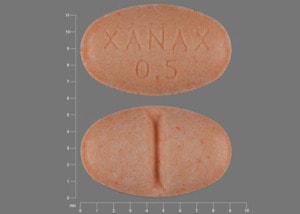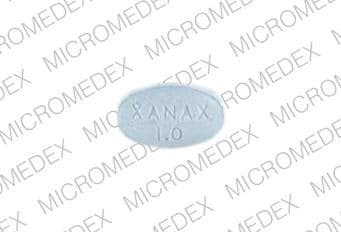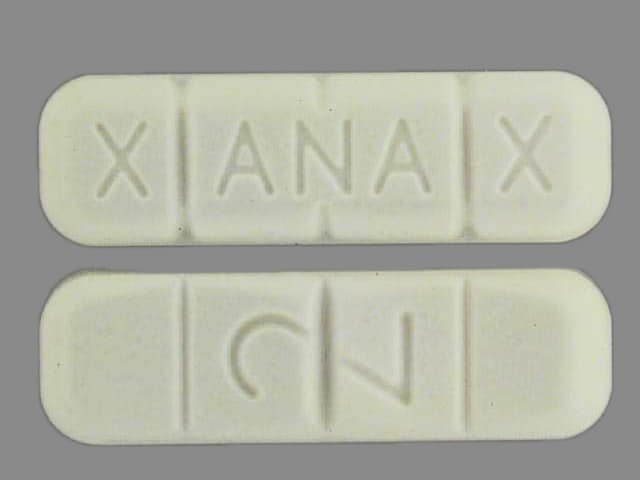What is Xanax?
Xanax is a prescription medicine used:
- to treat anxiety disorders
- for the short-term relief of the symptoms of anxiety
- to treat panic disorder with or without a fear of places and situations that might cause panic, helplessness, or embarrassment (agoraphobia).
Xanax is a federal controlled substance (C-IV) because it can be abused or lead to dependence. Keep Xanax in a safe place to prevent misuse and abuse. Selling or giving away Xanax may harm others, and is against the law. Tell your healthcare provider if you have abused or been dependent on alcohol, prescription medicines or street drugs.
It is not known if Xanax is safe and effective in children.
Elderly patients are especially susceptible to dose related adverse effects when taking Xanax.
It is not known if Xanax is safe and effective when used to treat anxiety disorder for longer than 4 months.
It is not known if Xanax is safe and effective when used to treat panic disorder for longer than 10 weeks.
What is the most important information I should know about Xanax?
- Xanax is a benzodiazepine medicine. Taking benzodiazepines with opioid medicines, alcohol, or other central nervous system depressants (including street drugs) can cause severe drowsiness, breathing problems (respiratory depression), coma and death.
- Xanax can make you sleepy or dizzy, and can slow your thinking and motor skills.
- Do not drive, operate heavy machinery, or do other dangerous activities until you know how Xanax affects you.
- Do not drink alcohol or take other drugs that may make you sleepy or dizzy while taking Xanax without first talking to your healthcare provider. When taken with alcohol or drugs that cause sleepiness or dizziness, Xanax may make your sleepiness or dizziness much worse.
- Do not take more Xanax than prescribed.
Who should not take Xanax?
Do not take Xanax if:
- you are allergic to alprazolam, other benzodiazepines, or any of the ingredients in XANAX. See the end of this Medication Guide for a complete list of ingredients in Xanax.
- you are taking antifungal medicines including ketoconazole and itraconazole.
What should I tell my healthcare provider before taking Xanax?
Before you take Xanax tell your healthcare provider about all of your medical conditions, including if you:
- have or have had depression, mood problems, or suicidal thoughts or behavior
- have liver or kidney problems
- have lung disease or breathing problems
- are pregnant or plan to become pregnant. Xanax may harm your unborn baby. You and your healthcare provider should decide if you should take Xanax while you are pregnant.
- are breastfeeding or plan to breastfeed. Xanax passes into your breast milk and may harm your baby. Talk to your healthcare provider about the best way to feed your baby if you take Xanax. You should not breastfeed while taking Xanax.
Tell your healthcare provider about all the medicines you take, including prescription and over-the-counter medicines, vitamins, and herbal supplements.
Taking Xanax with certain other medicines can cause side effects or affect how well Xanax or the other medicines work. Do not start or stop other medicines without talking to your healthcare provider.
How should I take Xanax?
- See "What is the most important information I should know about Xanax?" above.
- Take Xanax exactly as your healthcare provider tells you to take it. Your healthcare provider will tell you how much Xanax to take and when to take it.
- If you take too much Xanax, call your healthcare provider or go to the nearest hospital emergency room right away.
What should I avoid while taking Xanax?
- Xanax can cause you to be drowsy. Do not drive a car or operate heavy machinery until you know how Xanax affects you.
- You should not drink alcohol while taking Xanax. Drinking alcohol can increase your chances of having serious side effects.
What are the possible side effects of Xanax?
Xanax may cause serious side effects, including:
- See "What is the most important information I should know about Xanax?" above.
- Abuse and dependence. Taking Xanax can cause physical and psychological dependence. Physical and psychological dependence is not the same as drug addiction. Your healthcare provider can tell you more about the differences between physical and psychological dependence and drug addiction.
- Withdrawal symptoms. You may have withdrawal symptoms if you stop taking Xanax suddenly. Withdrawal symptoms can be serious and include seizures. Mild withdrawal symptoms include a depressed mood and trouble sleeping. Talk to your healthcare provider about slowly stopping Xanax to avoid withdrawal symptoms.
- Seizures. Stopping Xanax can cause seizures and seizures that will not stop (status epilepticus).
- Mania. Xanax may cause an increase in activity and talking (hypomania and mania) in people who have depression.
The most common side effects of Xanax include drowsiness and light-headedness.
These are not all the possible side effects of Xanax. Call your doctor for medical advice about side effects.
You may report side effects to FDA at 1-800-FDA-1088.
Xanax Images
Drug Interactions
A total of 571 medications are known to interact with Xanax. Use the Interactions Checker Tool.
Common Interactions Checks
General information about the safe and effective use of Xanax
Medicines are sometimes prescribed for purposes other than those listed in a Medication Guide. Do not use Xanax for a condition for which it was not prescribed. Do not give Xanax to other people, even if they have the same symptoms that you have. It may harm them. You can ask your pharmacist or healthcare provider for information about Xanax that is written for health professionals.
How should I store Xanax?
- Store Xanax between 68°F to 77°F 20°C to 25°C
- Keep Xanax and all medicines out of the reach of children.
What are the ingredients in Xanax?
Active ingredient: alprazolam
Inactive ingredients: Cellulose, corn starch, docusate sodium, lactose, magnesium stearate, silicon dioxide and sodium benzoate. In addition, the 0.5 mg tablet contains FD&C Yellow No. 6 and the 1 mg tablet contains FD&C Blue No. 2.








